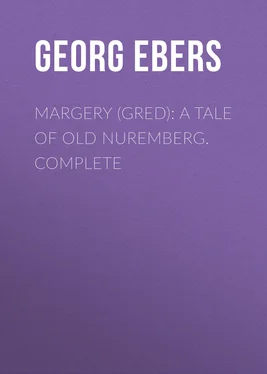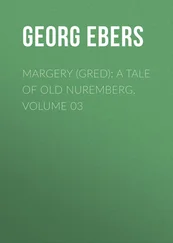Georg Ebers - Margery (Gred) - A Tale Of Old Nuremberg. Complete
Здесь есть возможность читать онлайн «Georg Ebers - Margery (Gred) - A Tale Of Old Nuremberg. Complete» — ознакомительный отрывок электронной книги совершенно бесплатно, а после прочтения отрывка купить полную версию. В некоторых случаях можно слушать аудио, скачать через торрент в формате fb2 и присутствует краткое содержание. Жанр: foreign_prose, literature_19, foreign_antique, на английском языке. Описание произведения, (предисловие) а так же отзывы посетителей доступны на портале библиотеки ЛибКат.
- Название:Margery (Gred): A Tale Of Old Nuremberg. Complete
- Автор:
- Жанр:
- Год:неизвестен
- ISBN:нет данных
- Рейтинг книги:3 / 5. Голосов: 1
-
Избранное:Добавить в избранное
- Отзывы:
-
Ваша оценка:
- 60
- 1
- 2
- 3
- 4
- 5
Margery (Gred): A Tale Of Old Nuremberg. Complete: краткое содержание, описание и аннотация
Предлагаем к чтению аннотацию, описание, краткое содержание или предисловие (зависит от того, что написал сам автор книги «Margery (Gred): A Tale Of Old Nuremberg. Complete»). Если вы не нашли необходимую информацию о книге — напишите в комментариях, мы постараемся отыскать её.
Margery (Gred): A Tale Of Old Nuremberg. Complete — читать онлайн ознакомительный отрывок
Ниже представлен текст книги, разбитый по страницам. Система сохранения места последней прочитанной страницы, позволяет с удобством читать онлайн бесплатно книгу «Margery (Gred): A Tale Of Old Nuremberg. Complete», без необходимости каждый раз заново искать на чём Вы остановились. Поставьте закладку, и сможете в любой момент перейти на страницу, на которой закончили чтение.
Интервал:
Закладка:
After this, one Sunday, it fell by chance that I went to mass with Ann to the church of St. Laurence, instead of St. Sebald’s to which we belonged. Having said my prayer, looking about me I beheld Gotz, and saw how, as he leaned against a pillar, he held his gaze fixed on one certain spot. My eyes followed his, and at once I saw whither they were drawn, for I saw a young maid of the citizen class in goodly, nay—in rich array, and she was herself of such rare and wonderful beauty that I myself could not take my eyes off her. And I remembered that I had met the wench erewhile on the feast-day of St. John, and that uncle Christian Pfinzing, my worshipful godfather, had pointed her out to Cousin Maud, and had said that she was the fairest maid in Nuremberg whom they called, and rightly, Fair Gertrude.
Now the longer I gazed at her the fairer I deemed her, and when Ann discovered to me, what I had at once divined, that this sweet maid was the daughter of Pernhart the coppersmith, my child’s heart was glad, for if my cousin was without dispute the finest figure of a man in the whole assembly Fair Gertrude was the sweetest maid, I thought, in the whole wide world.
If it had been possible that she could be of yet greater beauty it would but have added to my joy. And henceforth I would go as often as I might to St. Laurence’s, and past the coppersmith’s house to behold Fair Gertrude; and my heart beat high with gladness when she one day saw me pass and graciously bowed to my silent greeting, and looked in my face with friendly inquiry.
After this when Gotz came to our house I welcomed him gladly as heretofore; and one day, when I made bold to whisper in his ear that I had seen his fair Gertrude, and for certain no saint in heaven could have a sweeter face than hers, he thanked me with a bright look and it was from the bottom of his soul that he said: “If you could but know her faithful heart of gold!”
For all this Gotz was dearer to me than of old, and it uplifted me in my own conceit that he should put such trust in a foolish young thing as I was. But in later days it made me sad to see his frank and noble face grow ever more sorrowful, nay, and full of gloom; and I knew full well what pained him, for a child can often see much more than its elders deem. Matters had come to a sharp quarrel betwixt the son and the parents, and I knew my cousin well, and his iron will which was a by-word with us. And my aunt in the Forest was of the same temper; albeit her body was sickly, she was one of those women who will not bear to be withstood, and my heart hung heavy with fear when I conceived of the outcome of this matter.
Hence it was a boon indeed to me that I had my Ann for a friend, and could pour out to her all that filled my young soul with fears. How our cheeks would burn when many a time we spoke of the love which was the bond between Gotz and his fair Gertrude. To us, indeed, it was as yet a mystery, but that it was sweet and full of joy we deemed a certainty. We would have been fain to cry out to the Emperor and the world to take arms against the ruthless parents who were minded to tread so holy a blossom in the dust; but since this was not in our power we had dreams of essaying to touch the heart of my forest aunt, for she had but that one son and no daughter to make her glad, and I had ever been her favorite.
Thus passed many weeks, and one morning, when I came forth from school, I found Gotz with Cousin Maud who had been speaking with him, and her eyes were wet with tears; and I heard him cry out:
“It is in my mother’s power to drive me to misery and ruin; but no power in heaven or on earth can drive me to break the oath and forswear the faith I have sworn!”
And his cheeks were red, and I had never seen him look so great and tall.
Then, when he saw me, he held out both hands to me in his frank, loving way, and I took them with all my heart. At this he looked into my eyes which were full of tears, and he drew me hastily to him and kissed me on my brow for the first time in all his life, with strange passion; and without another word he ran out of the house-door into the street. My cousin gazed after him, shaking her head sadly and wiping her eyes; but when I asked her what was wrong with my cousin she would give me no tidings of the matter.
The next day we should have gone out to the forest, but we remained at home; Aunt Jacoba would see no one. Her son had turned his back on his parents’ dwelling, and had gone out as a stranger among strangers. And this was the first sore grief sent by Heaven on my young heart.
CHAPTER IV
Many of the fairest memories of my childhood are linked with the house where Ann’s parents dwelt. It was indeed but a simple home and not to be named with ours—the Schopperhof—for greatness or for riches; but it was a snug nest, and in divers ways so unlike ever another that it was full of pleasures for a child.
Master Spiesz, Ann’s father, had been bidden from Venice, where he had been in the service of the Mendel’s merchant house, to become head clerk in Nuremberg, first in the Chamber of Taxes, and then in the Chancery, a respectable post of much trust. His father was, as Ursula Tetzel had said in the school, a luteplayer; but he had long been held the head and chief of teachers of the noble art of music, and was so greatly respected by the clergy and laity that he was made master and leader of the church choir, and even in the houses of the city nobles his teaching of the lute and of singing was deemed the best. He was a right well-disposed and cheerful old man, of a rare good heart and temper, and of wondrous good devices. When the worshipful town council bid his son Veit Spiesz come back to Nuremberg, the old man must need fit up a proper house for him, since he himself was content with a small chamber, and the scribe was by this time married to the fair Giovanna, the daughter of one of the Sensali or brokers of the German Fondaco, and must have a home and hearth of his own.
[Sensali—Agents who conducted all matters of business between the German and Venetian merchants. Not even the smallest affair was settled without their intervention, on account of the duties demanded by the Republic. The Fondaco was the name of the great exchange established by the Republic itself for the German trade.]
The musician, who had as a student dwelt in Venice, hit on the fancy that he would give his daughter-in-law a home in Nuremberg like her father’s house, which stood on one of the canals in Venice; so he found a house with windows looking to the river, and which he therefore deemed fit to ease her homesickness. And verily the Venetian lady was pleased with the placing of her house, and yet more with the old man’s loving care for her; although the house was over tall, and so narrow that there were but two windows on each floor. Thus there was no manner of going to and fro in the Spiesz’s house, but only up and down. Notwithstanding, the Venetian lady loved it, and I have heard her say that there was no spot so sweet in all Nuremberg as the window seat on the second story of her house. There stood her spinning-wheel and sewing-box; and a bright Venice mirror, which, in jest, she would call “Dame Inquisitive,” showed her all that passed on the river and the Fleisch-brucke, for her house was not far from those which stood facing the Franciscan Friars. There she ruled in peace and good order, in love and all sweetness, and her children throve even as the flowers did under her hand: roses, auriculas, pinks and pansies; and whosoever went past the house in a boat could hear mirth within and the voice of song. For the Spiesz children had a fine ear for music, both from their grandsire and their mother, and sweet, clear, bell-like voices. My Ann was the queen of them all, and her nightingale’s throat drew even Herdegen to her with great power.
Читать дальшеИнтервал:
Закладка:
Похожие книги на «Margery (Gred): A Tale Of Old Nuremberg. Complete»
Представляем Вашему вниманию похожие книги на «Margery (Gred): A Tale Of Old Nuremberg. Complete» списком для выбора. Мы отобрали схожую по названию и смыслу литературу в надежде предоставить читателям больше вариантов отыскать новые, интересные, ещё непрочитанные произведения.
Обсуждение, отзывы о книге «Margery (Gred): A Tale Of Old Nuremberg. Complete» и просто собственные мнения читателей. Оставьте ваши комментарии, напишите, что Вы думаете о произведении, его смысле или главных героях. Укажите что конкретно понравилось, а что нет, и почему Вы так считаете.












